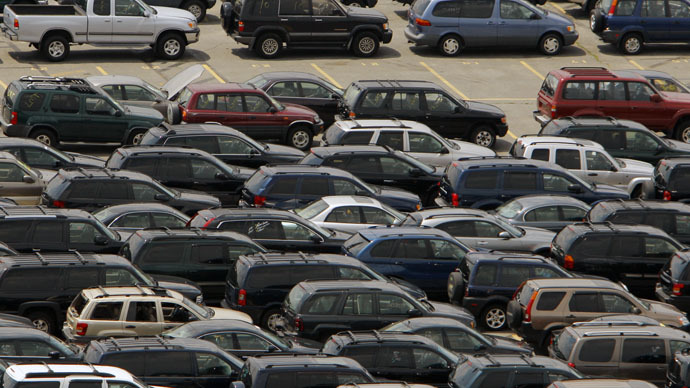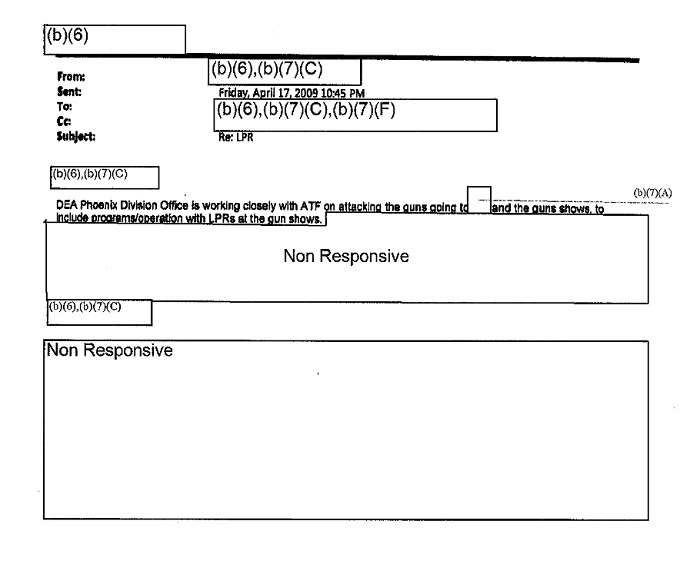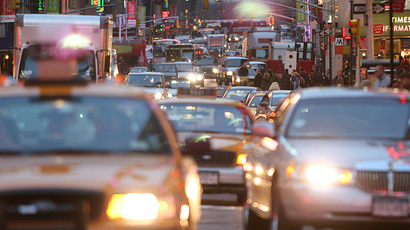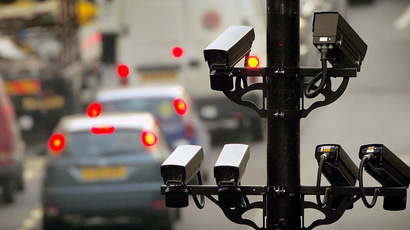DEA admits plan to monitor license plates at gun shows, says it was ‘never authorized’

The US Drug Enforcement Agency (DEA) considered tracking license plates at gun shows to develop a database of attendees, according to a newly released email. The Justice Department has a similar nationwide database compiled from surveillance technology.
The American Civil Liberties Union (ACLU) obtained an internal DEA email outlining the proposal to monitor parking lots outside a Phoenix, Arizona area gun show in 2009 by using automated license-plate readers (ALPRs). The intent was to aid gun-trafficking investigations.
The 2009 email is heavily redacted so as not to disclose the sender, recipient or much of the text beyond a single sentence: “DEA Phoenix Division office is working closely with ATF [the Bureau of Alcohol, Tobacco, Firearms, and Explosives] on attacking the guns going to [redacted] and the guns shows, to include programs/operation with [license-plate readers] at the gun shows.”

“[W]hen we received this document we concluded that these agencies used license plate readers to collect information about law-abiding citizens attending gun shows,” ACLU wrote in a blog post. “An automatic license plate reader cannot distinguish between people transporting illegal guns and those transporting legal guns, or no guns at all; it only documents the presence of any car driving to the event. Mere attendance at a gun show, it appeared, would have been enough to have one's presence noted in a DEA database.”
The ACLU received the redacted email as part of a Freedom of Information Act (FOIA) request. The internal message was part of a series of documents from the DEA outlining how the agency is building a national database tracking the movements of vehicles throughout the US.
“The proposal in the email was only a suggestion. It was never authorized by the DEA, and the idea under discussion in the email was never launched,” DEA administrator Michele Leonhart said, according to the Wall Street Journal..
The ACLU said that the agency’s response “alleviates some concerns,” but asked why the organization had not received any documents from the government reflecting its decision not to proceed in the DEA’s reply to the FOIA request.
“We were certainly glad to hear them say this, as we had rationally, based on the scrap of information left unredacted in the document, concluded that gun show monitoring was underway,” Bennett Stein and Jay Stanley wrote in the ACLU blog post. “After all, this would not be the first time that the government has used automatic license plate readers to target the constitutionally protected right to assemble.”
National Rifle Association spokesman Andrew Arulanandam told the Journal that the NRA is “looking into this to see if gun owners were improperly targeted, and has no further comment until we have all the facts.”
The ACLU noted that the civil liberties organization does not oppose the use of automated license plate readers in general “for their stated purpose of checking plates against ‘hot lists’ of known or suspected lawbreakers — provided the data on everyone else is not retained,” but noted that they have “serious concerns about using the technology in a way that is specifically targeted at people exercising their constitutionally protected rights.”
News of the proposal comes on the heels of the revelation that the Justice Department has been covertly gathering and storing hundreds of millions of records about American motorists for a national database. The database can track the movements of vehicles across the country.
The program was initially used by the DEA to seize cars, money, and other assets associated with drug trafficking. Use of the database has grown, however, to include hunting for vehicles linked to other possible crimes, including kidnapping, killings, and rape. State and local law enforcement agencies are increasingly employing the database for a variety of investigations.
Last February, the Department of Homeland Security announced ‒ then quickly canceled ‒ plans to create a similar database tracking license plates nationwide. The plan would have allowed DHS and other law enforcement officials to sift through a nationwide database of license plates once they were photographed, collected and stored on a system owned by a private company. Government officials said the database would be used to help locate illegal immigrants who are on the run from authorities, but civil liberties advocates became worried about the possibility that it would also be used to track the movement of American citizens.
The DEA’s gun-show tracking proposal came in April 2009, just six months before the Phoenix ATF office began its ill-fated gunwalking program, 'Operation Fast and Furious'.
The ACLU’s FOIA request was part of its 2012 public records requests in 38 states and Washington, DC, which sought information about the use of automatic license plate readers. The organization released the results of their requests in July 2013.














